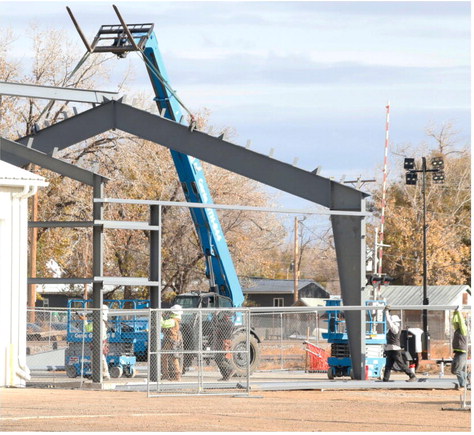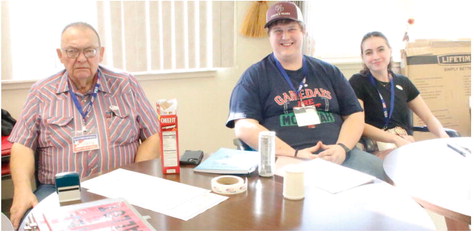Montana Rejects Initiatives To Reshape Elections
Montana voters rejected a pair of proposed constitutional amendments to reshape the state’s primary and general elections, with backers of both initiatives conceding defeat Wednesday despite ongoing ballot counts in several counties.
The measures — Constitutional Initiative 126 and CI-127 — would have brought noticeable change to how Montanans select their elected officials. The former sought to shift the state from separate party ballots to a single multi-party ballot, with the top four vote-getters in each race advancing to a general election. The latter would have required a candidate to receive a majority of the vote to declare victory in a general election and direct the Legislature to adopt a system for declaring a winner in a no-majority scenario. Those changes would have applied strictly to federal, statewide and legislative races.
CI-126 had eked out a much closer margin than its general- election-centric counterpart — 48% in support versus 52% in opposition. Defeat was much more decisive for CI-127, which was rejected by 61% of voters as of Wednesday morning’s count.
The initiative-backing group Montanans for Election Reform accepted the defeat of both initiatives around noon Wednesday, noting that despite CI-126’s narrower margin and the ongoing ballot counts five major counties, there was no path to victory. MER board member Frank Garner, former Republican state lawmaker from Kalispell, called it a “disappointing day,” attributing the initiative’s uphill battle to powerful outside influences.
“We fought hard against the entrenched politicians and special interests who didn’t want to give voters more voice and better choices on the ballot because the current system benefits them, not voters,” Garner said in an email statement. “We still believe open primaries are a powerful tool to hold politicians accountable and put the power over our elections back in the hands of voters, but they aren’t the only path forward. We will continue to stand up for freedom and choice in our elections.”
In a later interview with Montana Free Press, Garner described the night as a “roller coaster” and said he was encouraged by the support the initiatives, particularly CI-126, were able to obtain despite their eventual defeat. Change is a hard thing to sell to voters, he continued, especially when it involves as fundamental an institution as the election process.
“In my experience, people’s reaction to making institutional changes, if they have some doubt, is not to because the status quo, even if you don’t like it, is still the devil you know and there is some level of comfort in that,” Garner said. “So making the case for institutional change on a process like this, that we’ve done for so long, is a big lift.”
MER spent millions of dollars in the weeks leading up to Election Day communicating their arguments to the electorate. Disclosure records from the Montana Commissioner of Political Practices show the group received nearly $13 million since late September from the national nonprofit Article IV, which had already contributed roughly $4 million to MER this year. According to MER spokesperson Caitie Butler, the pre-election funds primarily went toward broadcast and digital advertising, and residents across the state were flooded with thousands of mailers. The group previously attributed the influx of outside financial support to a need to compete with the U.S. Senate race for voter attention, and Butler noted that, unlike political candidates, ballot issue committees are not guaranteed discounted rates on public advertising under federal law.
Opponents of CI-126 and CI127 similarly sought to spread the word of their stance ahead of the polls, with the Montana Freedom Caucus’ political committee dropping several thousand dollars on social media advertising. One such ad appearing on Instagram this week focused on the committee’s belief that CI-127’s passage would prompt the Montana Legislature to adopt ranked-choice voting, a prediction the animated video’s narrator claimed would result in thousands of votes getting “thrown in the trash.”
Lukas Schubert, spokesperson for Montanans for Fair Elections, told MTFP in an email statement that the opposition group was “pleased” by the results of CI-126 and CI-127.
“Out-of-state organizations spent $20 million (accounting for 98% of total funding) in an attempt to purchase changes in Montana’s constitution and the way that we vote,” Schubert wrote. “However, Montanans saw through their scheme to implement a California- style election system that would have created worse election outcomes, and rejected their proposals.”
Both initiatives met with legal hurdles on their path to the ballot over the past year, starting with Republican Attorney General Austin Knudsen’s challenge against CI-126’s legal sufficiency in fall 2023 and culminating this summer in a lawsuit over the eligibility of signatures from certain supporters. In the latter case, which also impacted CI-128, Republican Secretary of State Christi Jacobsen sought to disqualify thousands of signatures from Montanans listed as “inactive voters” but was prohibited from doing so by a state district court.
CI-127’s sizable defeat washed across the state, with the majority of voters in all but a handful of counties rejecting the proposed change to Montana’s general elections. CI-126 received a warmer reception in several rural counties with strong Indigenous communities and larger population centers in Bozeman, Butte and Helena, but still failed to secure a simple majority of the vote statewide.
For Garner, who came to this initiative process from a deep background of opposing outside influence in Montana politics, reflecting on other election night developments only strengthened his conviction that voters’ interests would be best served through some sort of reform. That Donald Trump could claim such a resounding victory in Montana on the same night a strong majority of voters across the state embraced protecting abortion rights in their Constitution is, in Garner’s eyes, striking evidence of the diversity of the Montana electorate.
“We don’t always see things the same way, regardless of party labels, and I think that’s one of the things that helped me and drove me to be involved in an initiative like this,” Garner said. “For me, my role is to help make sure that government is serving the needs of this really diverse population that apparently, according to the math, doesn’t see everything exactly the same way.”

